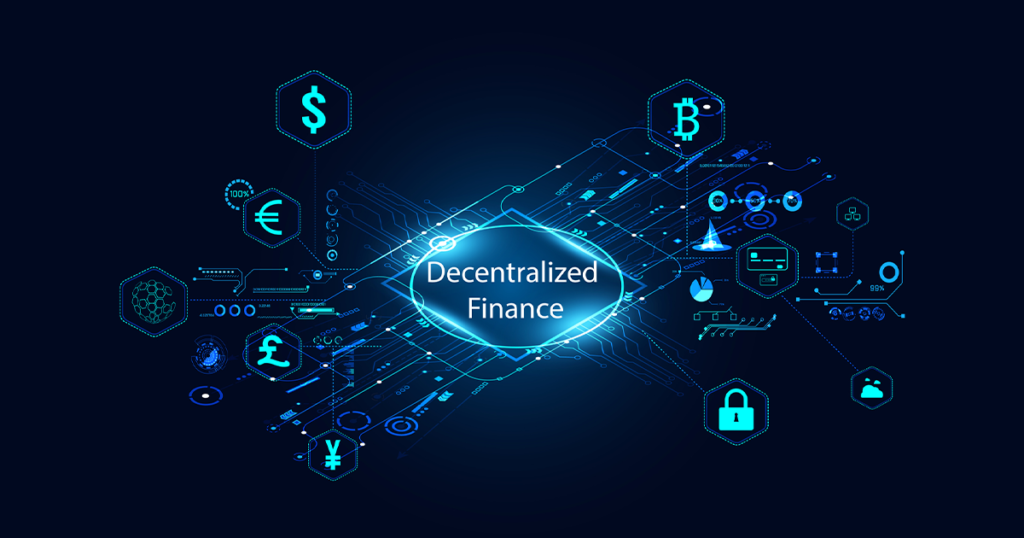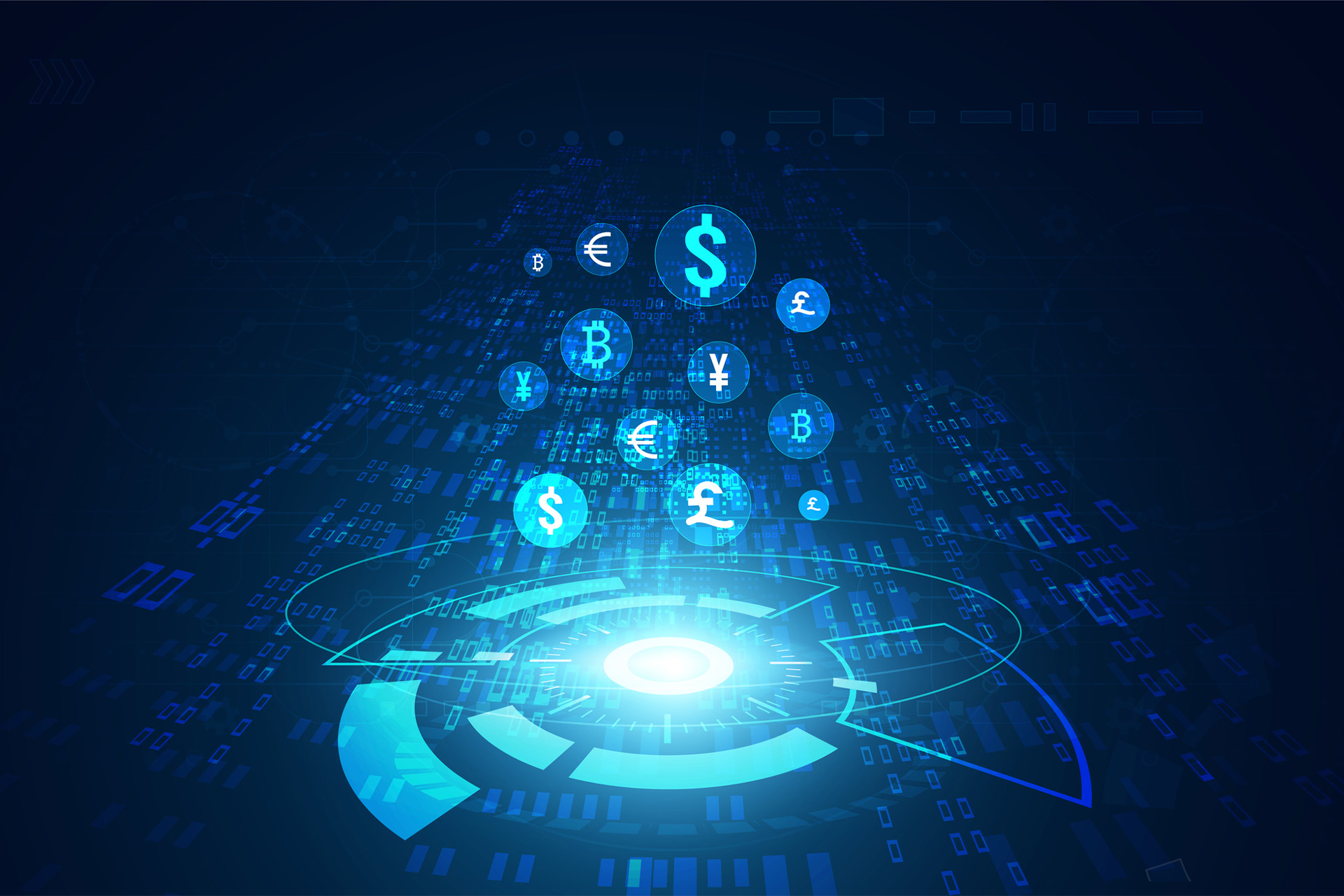Decentralized finance – often referred to as DeFi – is an emerging sector of the cryptocurrency and blockchain industry that offers users access to global financial services without any involvement of centralized intermediaries.1 In traditional finance, banks maintain the custody of your funds, they manage the process of lending and borrowing, and facilitate the transfer and settlement of money between accounts using the intrabank and interbank systems such as ACH, Fedwire, and SWIFT. In addition to banks, brokerage services – such as Ameritrade, Robinhood, and Coinbase – receive and fill your orders to buy or sell securities with the help of other institutions that help create liquidity in the market. The DeFi economy strives to eliminate the need for centralized intermediaries by making most financial services possible in a peer-to-peer manner with the help of smart contracts and blockchain technology.
How Does DeFi work?
DeFi is accessible to anyone who has a practical understanding of Ethereum (or another smart contract platform) and has an internet connection. Smart contracts are applications that are stored on a blockchain network and automatically execute when certain predetermined conditions are met. These decentralized applications (DApps) function using lines of open-source code that govern the terms of any agreement and make transactions irreversible.

What are the Benefits of DeFi?
DeFi creates a fair, transparent, permissionless, and cost-effective financial system where everyone can participate. Some of the traditional financial services disrupted by DeFi include self-custody of funds, lending and borrowing, and trading.
Self-Custody of Funds
In the DeFi economy, users control their own funds in digital wallets that allow them to store, send, and receive cryptocurrencies and tokens.2 In traditional finance, although the contents of your bank account may be yours, your bank controls access to it and can freeze your account at a moment’s notice. Digital wallets, like MetaMask, give you the control of your “private keys” that allow you to securely access your digital assets. Each private key is linked to a public key, also known as a wallet address, that allows you to safeguard your crypto assets and access services like lending, borrowing, and trading.
Lending and Borrowing
Lending and borrowing is a huge part of the DeFi economy. DApps, like AAVE and Compound, enable users to lock their digital assets into a smart contract and borrow against their position.3 Users can also lock their digital assets into a smart contract and generate rewards by allowing their assets to be lent out to borrowers.4 Because the entire process is facilitated by smart contracts, users do not need to know or trust one another and do not require a third-party intermediary to function. Rewards generated by lenders are substantially higher than the interest you get from a bank. In traditional finance, you deposit your funds into a bank and then the bank lends your money to other clients and in turn makes a profit. The downside to that business model is that the depositor benefits very little from it, with current interest rates sitting at 0.01%. Borrowing money from a bank is also very time-consuming as you’ll need to pass a credit check, show proof of income, and comply with KYC regulations.
Trading Digital Assets with DeFi
With DeFi, there are no centralized intermediaries who can block payments or deny your access to trading. Instead, users trade crypto tokens using decentralized exchanges – Uniswap, Sushiswap, Bancor – composed of smart contracts that hold liquidity reserves and allow for decentralized token swaps. Once a buy or sell order is executed, your crypto assets will automatically appear in your digital wallet. In traditional finance, you are at the mercy of brokerages to organize the trading of different assets and take custody of your assets with each trade. As we’ve recently seen with Robinhood brokerages can deny you trading access when it doesn’t suit their financial needs.5
What are the Risks in DeFi?
There are risks that users need to be aware of before participating in the DeFi economy, mainly custody risk, lending risk, and oracle risk. The biggest self-custody risk is the loss of funds due to security breaches or mistakes made by the owner. If someone gains access to your private keys, your funds are as good as gone. If you send your digital assets to the wrong address, there is no customer service number you can call to reverse the financial transaction. In 2021, $2.9 billion were stolen from individuals using different forms of self-custody.
When lending your digital assets, you need to be aware of the “liquidation price,” which triggers an automatic sell-off to protect the lender from incurring losses. Because crypto markets are known for high volatility, liquidations are far too common. Another risk when lending is known as a “rug pull,” which refers to a situation whereby crypto developers abandon a project and run away with investors’ funds.6 Don’t invest into anything that you haven’t done your due diligence on.
Most smart contract use cases like DeFi use oracles to provide information of real-world data and events happening off-chain.7 Because the data provided by oracles directly determines the outcome of smart contracts, the data has to be correct in order for the agreement to execute properly. Some oracles are vulnerable to attack if the attacker’s potential profits from corruption become larger than the oracle’s cost of corruption.

How Gordon Delic & Associates Can Help
The attorneys at Gordon, Delic and Associates understand the DeFi economy and the underlying technology. We advise clients on several aspects of DeFi, including the legality of DeFi platforms and exchanges, and their trading activities.
If you have any questions or want to schedule a consultation with one of our attorneys feel free to contact us or call our office at (208) 900–9509.
Contact
References:
- https://www.coinbase.com/learn/crypto-basics/what-is-defi
- https://www.ledger.com/academy/tips-to-trust-yourself-in-becoming-your-own-bank
- https://aave.com/
- https://www.blockchain-council.org/blockchain/how-lending-and-borrowing-take-place-in-decentralized-finance-defi/
- https://www.cnbc.com/2021/02/17/robinhood-faces-lawsuits-after-gamestop-trading-halt.html
- https://cointelegraph.com/explained/crypto-rug-pulls-what-is-a-rug-pull-in-crypto-and-6-ways-to-spot-it
- https://chain.link/education/blockchain-oracles?_ga=2.86388062.794858089.1647026217-1643876318.1647026217



